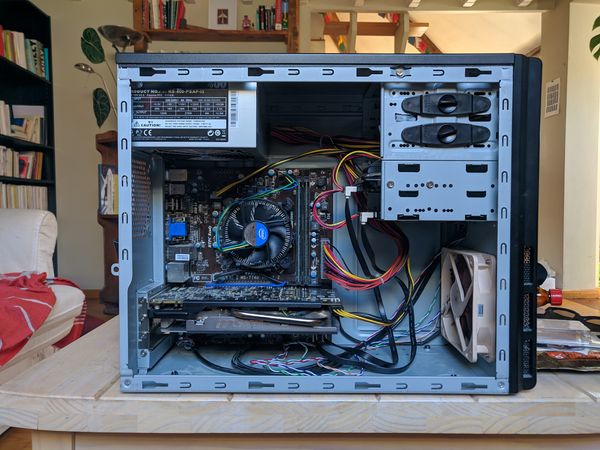Discours marquants : Bodies upon the gears et Le Dictateur
Il est parfois de ces discours qui me font frissonner, tout simplement : ils me prennent aux tripes, me soulèvent avec une violence inouïe, et me donnent envie d’embrasser de grandes causes. Surtout, cela me pousse à continuer à me battre pour mes idées, à mon échelle, comme la désobéissance civile par exemple.
Rien de bien innovant, je l’admets, puisque c’est le principe-même des discours militants, le travail de l’orateur qui porte la foule, et cette dernière qui le porte lui – homme d’actes mais surtout de mots. Pourtant je ne m’en lasse pas, ce qui suit fait écho en moi, le poids des mots justes et forts frappe juste là où il faut, en pleine sensibilité sociale.
Bodies upon the gears
Le premier est un discours de Mario Savio, défenseur du « Mouvement pour la liberté d’expression » (Université de Berkeley, 1964 — 1965) :
There is a time when the operation of the machine becomes so odious, makes you so sick at heart, that you can’t take part; you can’t even passively take part, and you’ve got to put your bodies upon the gears and upon the wheels, upon the levers, upon all the apparatus, and you’ve got to make it stop. And you’ve got to indicate to the people who run it, to the people who own it, that unless you’re free, the machine will be prevented from working at all !
Je vous invite d’ailleurs à lire l’intégralité de ce discours en anglais, rien que pour sa valeur historique. Des mots qui pour moi martèlent l’air, et me rendent tout chose — ému, presque, par la volonté débordante de l’homme.
À noter que vous pouvez avoir déjà entendu cette tirade, dans une chanson de Linkin Park par exemple : Wretches and Kings, sur l’album A Thousand Suns, en contient une partie (écoutez-la ici). Ailleurs – j’en ai déjà parlé d’ailleurs –, vous pouvez l’entendre au milieu de la chanson We are the new ones, sur l’album Ultrawired de Dope Stars Inc.
Le discours du Barbier
Un autre discours qui me marque encore énormément, c’est la scène finale de The Great Dictator (Le Dictateur, en français, sorti en 1940) interprétée par Charlie Chaplin (voyez ici vidéo).
I’m sorry, but I don’t want to be an Emperor – that’s not my business. I don’t want to rule or conquer anyone. I should like to help everyone, if possible — Jew, gentile, black man, white. We all want to help one another; human beings are like that. We want to live by each other’s happiness, not by each other’s misery. We don’t want to hate and despise one another. In this world there’s room for everyone and the good earth is rich and can provide for everyone.
The way of life can be free and beautiful.
But we have lost the way.
Greed has poisoned men’s souls, has barricaded the world with hate, has goose-stepped us into misery and bloodshed. We have developed speed but we have shut ourselves in. Machinery that gives abundance has left us in want. Our knowledge has made us cynical, our cleverness hard and unkind. We think too much and feel too little. More than machinery, we need humanity. More than cleverness, we need kindness and gentleness. Without these qualities, life will be violent and all will be lost.
The aeroplane and the radio have brought us closer together. The very nature of these inventions cries out for the goodness in men, cries out for universal brotherhood for the unity of us all. Even now my voice is reaching millions throughout the world, millions of despairing men, women, and little children, victims of a system that makes men torture and imprison innocent people.
To those who can hear me I say, « Do not despair. » The misery that is now upon us is but the passing of greed, the bitterness of men who fear the way of human progress. The hate of men will pass and dictators die; and the power they took from the people will return to the people and so long as men die, liberty will never perish.
Soldiers: Don’t give yourselves to brutes, men who despise you, enslave you, who regiment your lives, tell you what to do, what to think and what to feel; who drill you, diet you, treat you like cattle, use you as cannon fodder. Don’t give yourselves to these unnatural men, machine men, with machine minds and machine hearts! You are not machines! You are not cattle! You are men! You have the love of humanity in your hearts. You don’t hate; only the unloved hate, the unloved and the unnatural.
Soldiers: Don’t fight for slavery! Fight for liberty! In the seventeenth chapter of Saint Luke it is written, « the kingdom of God is within man » — not one man, nor a group of men, but in all men, in you, you the people have the power, the power to create machines, the power to create happiness. You the people have the power to make this life free and beautiful, to make this life a wonderful adventure.
Then, in the name of democracy, let us use that power! Let us all unite! Let us fight for a new world, a decent world that will give men a chance to work, that will give you the future and old age a security. By the promise of these things, brutes have risen to power, but they lie! They do not fulfill their promise; they never will. Dictators free themselves, but they enslave the people!! Now, let us fight to fulfill that promise!! Let us fight to free the world, to do away with national barriers, to do away with greed, with hate and intolerance. Let us fight for a world of reason, a world where science and progress will lead to all men’s happiness.
Soldiers: In the name of democracy, let us all unite!
— Charlie Chaplin, Le dictateur, 1940 (source et traduction)
Je me passerai de commentaire — finalement, c’est bien plus pour le partage, et la possible découverte. Je suis trop plein d’un immense espoir, d’une énorme bulle dans le ventre et la poitrine qui m’empêche de m’exprimer comme je le voudrais. Cette fois-ci je préférerai un silence mérité.
Une autre fois, peut-être, présenterai-je d’autres discours que j’estime fondateurs.
Battez-vous bien.





